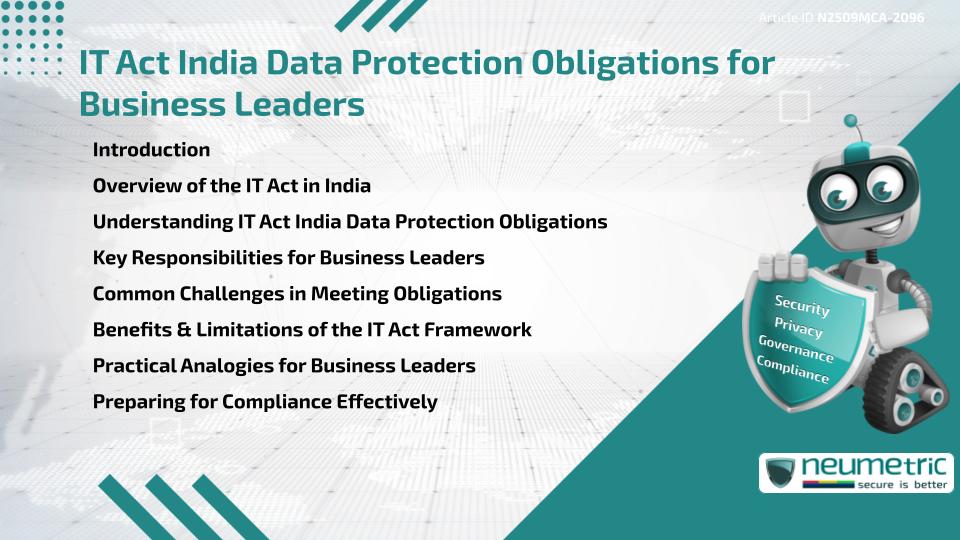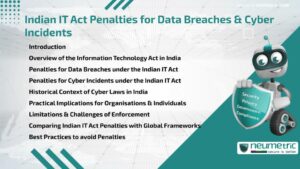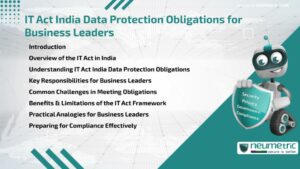Table of Contents
ToggleIntroduction
The IT Act India Data Protection Obligations define how organisations in India should handle Personal & Sensitive Data. For Business Leaders, these obligations are crucial for safeguarding Information, maintaining Customer Trust & avoiding Penalties. The Information Technology Act, 2000 [IT Act], together with its amendments & associated rules, sets standards for data collection, storage, transfer & security. This article explains the IT Act India Data Protection Obligations, the responsibilities of Business Leaders, common challenges, benefits & limitations of the Framework & practical strategies to prepare for compliance.
Overview of the IT Act in India
The Information Technology Act, 2000, was introduced to provide legal recognition for electronic records & transactions. Over time, it has evolved to include provisions for Cybersecurity, Privacy & Data Protection. Key amendments, such as the Information Technology [Reasonable Security Practices & Procedures & Sensitive Personal Data or Information] Rules, 2011, have clarified responsibilities for businesses in handling data.
The Act empowers regulatory bodies to impose penalties for non-Compliance & gives individuals the right to seek compensation for Data Breaches.
Understanding IT Act India Data Protection Obligations
The IT Act India Data Protection Obligations require businesses to:
- Obtain informed Consent before collecting Personal Data.
- Implement Reasonable Security Practices & Procedures.
- Limit data use to the Purpose for which it was collected.
- Allow Individuals to Review & Correct their information.
- Maintain contracts with Third Parties to ensure Secure processing.
These obligations are designed to balance organisational needs with individual rights, ensuring that businesses treat data responsibly.
Key Responsibilities for Business Leaders
Business Leaders play a central role in meeting the IT Act India Data Protection Obligations. Their responsibilities include:
- Establishing a Governance Framework for Data Protection.
- Ensuring that internal teams are trained in Compliance practices.
- Monitoring Vendors & Service Providers for adherence to the law.
- Allocating resources for Cybersecurity infrastructure.
- Responding swiftly to Incidents or Breaches.
In practice, leadership involvement signals a top-down commitment to compliance.
Common Challenges in Meeting Obligations
Many organisations struggle with:
- Inconsistent awareness among Employees about obligations.
- Limited budgets for robust Cybersecurity measures.
- Complexity of monitoring Third Party Processors.
- Uncertainty in interpreting evolving regulatory requirements.
- Balancing operational efficiency with Compliance needs.
Recognising these challenges enables Business Leaders to take proactive steps in mitigating Risks.
Benefits & Limitations of the IT Act Framework
The IT Act India Data Protection Obligations create multiple benefits:
- Enhanced Trust between Businesses & Customers.
- Legal protection for organisations demonstrating Compliance.
- Standardisation of practices across industries.
- Reduced Likelihood of reputational harm from Breaches.
However, limitations exist. The Act has been criticised for lacking comprehensive coverage compared to global frameworks like the General Data Protection Regulation [GDPR]. It also places responsibility heavily on organisations, which may strain smaller businesses.
Practical Analogies for Business Leaders
The IT Act India Data Protection Obligations can be compared to Fire Safety regulations in a building. Just as owners must install alarms, train occupants & prepare for emergencies, Business Leaders must install Security Measures, train staff & plan for Data Incidents. Both frameworks aim to prevent harm while ensuring Accountability.
Preparing for Compliance Effectively
To comply with the IT Act India Data Protection Obligations, Business Leaders should:
- Appoint a Data Protection Officer or equivalent role.
- Regularly Audit systems & practices.
- Update Policies to reflect legal requirements.
- Invest in Awareness Programs for Employees.
- Engage with Legal & Compliance experts for guidance.
The Data Security Council of India provides guidance & industry practices for organisations seeking compliance.
Takeaways
- The IT Act India Data Protection Obligations define legal responsibilities for businesses.
- Business Leaders must ensure Governance, Training & Monitoring.
- Common challenges include limited resources & regulatory complexity.
- Benefits include Trust, Legal protection & Risk reduction.
- Proactive Planning & Audits are essential for effective Compliance.
FAQ
What are the IT Act India Data Protection Obligations?
They are legal responsibilities for businesses in India to protect Personal & Sensitive Data.
Why are these obligations important for Business Leaders?
They help Leaders build Trust, avoid Penalties & safeguard Customer Information.
What are examples of sensitive Personal Data under the IT Act?
Passwords, Financial Information, Health details & Biometric data.
Who enforces the IT Act India Data Protection Obligations?
The Ministry of Electronics & Information Technology & Adjudicating Authorities.
How can businesses demonstrate compliance?
By adopting Security Practices, obtaining Consent & maintaining Contracts with third parties.
What happens if a business fails to comply with obligations?
It may face Financial penalties, Reputational damage & Customer loss.
Do Small Businesses also need to follow the obligations?
Yes, all organisations that handle Sensitive Personal Data are required to comply.
Need help for Security, Privacy, Governance & VAPT?
Neumetric provides organisations the necessary help to achieve their Cybersecurity, Compliance, Governance, Privacy, Certifications & Pentesting needs.
Organisations & Businesses, specifically those which provide SaaS & AI Solutions in the Fintech, BFSI & other regulated sectors, usually need a Cybersecurity Partner for meeting & maintaining the ongoing Security & Privacy needs & requirements of their Enterprise Clients & Privacy conscious Customers.
SOC 2, ISO 27001, ISO 42001, NIST, HIPAA, HECVAT, EU GDPR are some of the Frameworks that are served by Fusion – a SaaS, multimodular, multitenant, centralised, automated, Cybersecurity & Compliance Management system.
Neumetric also provides Expert Services for technical security which covers VAPT for Web Applications, APIs, iOS & Android Mobile Apps, Security Testing for AWS & other Cloud Environments & Cloud Infrastructure & other similar scopes.
Reach out to us by Email or filling out the Contact Form…





